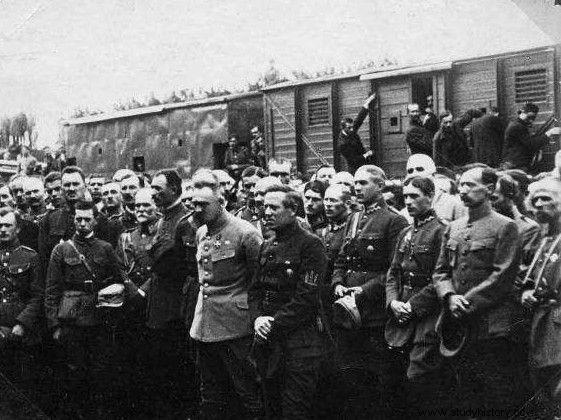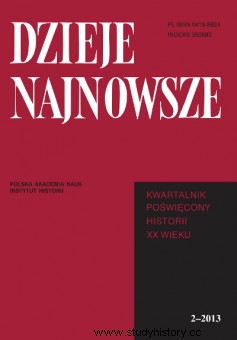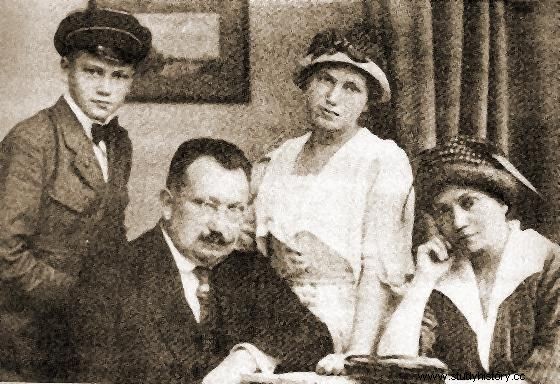Historians have written for years about the Polish spy outpost in Soviet Ukraine and its many successes. As it turns out, this branch ... did not exist at all. In turn, the conspiratorial network associated with it was probably a provocation of hostile services.
1927. A Ukrainian, Mykola Chebotariv, is coming to the Soviet Kharkiv. In the city, he sets up an intelligence post "Hetman" and begins building a spy network. He runs a propaganda campaign and organizes an anti-Soviet conspiracy . Exciting? Unfortunately not true.
The view about the existence of the described facility was well established in scientific literature, including Ukrainian. He mentioned her, among others Andrzej Pepłoński in the monograph "Polish interview in the USSR". A few years ago, Timothy Snyder found a complete set of documents that survived the activities of "Hetman" and devoted an entire chapter of the book "Secret War." Henryk Józewski and the Polish-Soviet game for Ukraine ”. Now, in truth, this chapter would be torn off or deleted…

Józef Piłsudski, Symon Petliura and Polish and Ukrainian officers, Stanisławów 1920 (photo:public domain).
Ghost hetman
Mykola Chebotariw was one of Symon Petliura's supporters, who remained in the Commonwealth after the end of the Polish-Bolshevik war. In 1927, he became the head of the Polish-financed Petlurian intelligence in Warsaw, but at the same time he acted for the military intelligence of the Second Polish Republic. He was to set up "Hetman" as a Polish agent. But he didn't.
The validity of the findings regarding the alleged facility in Kharkiv has recently been challenged by Jan Jacek Bruski from the Jagiellonian University. It turned out that there are no traces of Chebotariv's journey to Soviet Ukraine , and his letters show that he stayed in Poland all the time, from where he only traveled to Western Europe. Anyway, would he be able to organize a Ukrainian intelligence service in Warsaw and be in Kharkiv at the same time?

The material is based on a scientific article published in the journal "Dzieje Latest".
Re-examination of the materials found by Snyder revealed that "Hetman" was in fact a code name interview of the Petlurowców in Warsaw . The reports submitted by the alleged office in Kharkiv are consistent with those listed in the archives as a result of the work of Ukrainian services led by Chebotariv.
Interview without success
Although Chebotariv did not operate directly in Kharkiv, he nevertheless tried to conduct active intelligence activities in Soviet Ukraine . However, the information collected by his people was poorly assessed by the Polish services . These were mostly commonly known or unreliable messages, which even gave the impression of being inspired by the Soviets.

Andrij Liwycki with his family, after the death of Symon Petliura in 1926, the leader of the Polish emigration, the head of Chebotariv (photo:public domain).
According to Jan Bruski, the Polish side undoubtedly attached (...) more importance to another (...) aspect of the activities of Ukrainian allies. It was about the political subversion behind Zbrucz. Unfortunately, there are many indications that the conspiracy created there under the name of the Union for the Struggle for Independent Ukraine was in fact another provocation of the Soviet counterintelligence ...
The source of the above news is:
Jan Jacek Bruski, Mykola Chebotariw and the "Hetman" facility. From the history of Ukrainian special services in exile , "The History of the Latest", year 45 (2013), no. 2, pp. 53-65.
Historical news. What's the matter?
 | The "historical news" column is the latest news from the world of history. We are looking for missed and concealed discoveries of Polish (and not only) scientists. We show that there is always something going on in research on the past. |
 | Our news is short and accessible. On 2-3 thousand signs, we will summarize for you the discoveries that scientists have made on dozens of pages of hermetic works. We only write about what really matters. No boring. |
 | We rely on scientific publications from the last 18 months . In the world of history, news spreads slowly, and academic works reach potential recipients with a long delay. What in other fields ceases to be news after 24 hours in history, it may even be a year later. |
 | When preparing news, we follow the list of the most prestigious historical periodicals. If you are a publisher or author and would like us to reach for a specific publication - please send it to our editorial office. |
